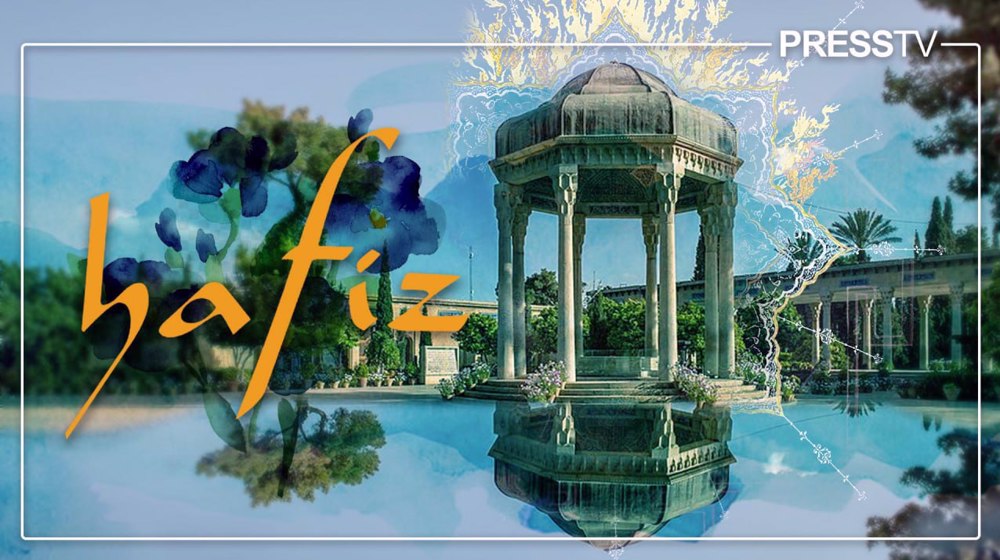How Iran’s ‘national poet’ Hafez Shirazi captivated hearts worldwide with his verse
By Humaira Ahad
Surrounded by mighty trees and beautiful orchards lies the mausoleum of Hafez Shirazi in the cultural capital of the Islamic Republic of Iran, Shiraz. The ‘national poet’ of Iran is resting peacefully, visited by legions of his devotees from across the world every day.
While I was lost in deep thought staring at his grave, a rosy-cheeked boy came rushing and insisted that I consult Hafez for divination and promised that the poet would provide answers to my questions.
Hafez is not confined to Hafezieh, the up-scale area where his final resting place is situated in Shiraz, but seeped into the everyday life of Iranians, young and old, urban or rural.
At every place and on every important occasion, Iranians consult the Persian poet’s masterpiece ‘Divan e Hafez’ to seek answers, help and guidance. The poet never disappoints.
Poetry, in particular, that of Hafez, occupies a significant place in Iranian society. This art form is an important part of the lives of all Iranians.
From the crowded streets of Tehran to the sleepy hamlets of Khorasan, from the vast deserts of Yazd to the dense forests of Mazandaran, poetry resonates everywhere.
A taxi driver reciting Maulana Rumi, a baker quoting Khayyam, or a doctor using verses of Saadi to communicate an idea to his patients is a common sight in Iran.
However, among all Persian poets, Hafez occupies a special place for Iranians.
They not only consult him to foresee their future through “Faal-e-Hafez” (augury), but the poetry of the celebrated poet has had a lasting influence on great people, including the founder of the Islamic Revolution, Imam Khomeini.
Khawaje Shams-u-Din Moḥammad Ḥafeẓ Shirazi was born in 1315 in the city of Shiraz. Having memorized the Holy Quran at a young age, he was bestowed the title of “Hafez”.
The spiritual enlightenment that Hafez attained and personified traveled beyond the borders of Iran and influenced the great minds of the world, in both the East and the West.
Reciting the poetry of the master lyricist in Persian acts as a soothing balm for parched souls. For many, his poetry is a rendezvous with nature where the whistling of the breeze, the songs of the birds, the murmuring of the streams of water, and the whole orchestra of nature help them enjoy the joy of life.
Hafez and the West
The influence of Hafez extends far beyond contemporary Iran. The poetry of the Nightingale of Shiraz has had a hypnotic influence only on the East, but his verses also inspired poets in the West.
Founding oriental studies as an academic field, the prominent orientalist, Joseph von Hammer Purgstall, translated the Diwan e Hafiz in 1846. The translated work inspired Goethe to create a collection of poems titled The West-Eastern Divan.
The poetry of Hafez led Goethe, the legendary German philosopher, to call him “Saint Hafiz” and a “Celestial Friend”, as it oozes with spiritualism and asceticism.
For Goethe, Persian poetic language reached its zenith in the verses of Hafez in whom he was able to find the magnificence of ideas and the view of the world he had been searching all his life.
Inspired by Goethe’s West-Eastern Divan, a number of German poets, including Friedrich Ruckert and August von Platen, composed poems on the model of Ghazal.
Hafez’s poetry is considered the very epitome of the Ghazal tradition.
Prominent among the German thinkers fascinated by Hafez was Friedrich Nietzsche, who repeatedly mentioned him in his seminal works.
Nietzsche was deeply interested in Hafez and praised him as an ideal poet and spent many years reading his works. The Persian poet appears almost a dozen times in the writings of Nietzsche.
“Nietzsche praised Hafez for ‘mocking blissfully’. For him, Hafez is the Oriental free-spirit man who keeps celebrating the joys and sorrows of life. Nietzsche commends such an attitude as a sign of a positive and courageous valuation of life,” writes Dariush Ashouri, a prominent Iranian thinker.
According to Ashouri, Nietzsche finds in Hafez a prime example of ‘Dionysian’ ecstatic wisdom, which he extols extensively in his philosophy.
In a poem dedicated to Hafez, Nietzsche glorifies the insight of the Persian poet and his poetry.
“The tavern you have built with your hand is far greater than any house, the wine you have made therein all the world fails to imbibe, the bird which was once called the phoenix is now dwelling in your house, the mouse which gave birth to a mountain is yourself, you are everyone and no one,” he writes.
“You are the tavern and the wine you are the phoenix, the mountain and the mouse you keep pouring in yourself, and you keep filling with yourself the deepest valley you are the brightest light you are the intoxication of all intoxication you are what need do you have to ask for wine.”
Hafez’s timeless poetry
For Sir William Jones, the famous British philologist, the poetry of Hafez was a form of meditation on divine perfection. The first poem of Hafez to have appeared in the English language was translated by Jones in the eighteenth century.
The poem was titled “A Persian Song” and played a significant role in introducing the bard of Shiraz to the English-speaking world.
According to the famous German orientalist Annamarie Schimmel, Hafez is like a pure decorated jewel with endless colors. His words are not restricted by time, but he is a poet who has crossed the limitations of time and space and is universal belonging to all times.
However, as per Schimmel, understanding Hafez is not easy as he uses a secret language, and only those who can understand the culture of Hafez can understand him and his poetry.
While discussing Hafez and his poetry in a conversation with the Press TV website, Sonia, a French student of Islamic studies said, “The knowledge of God is essential for the attainment of love.”
“Even prayer without love is meaningless, Hafiz teaches us to love and perfect our prayer,” she said.
The influence of Hafez stretched from Europe to America, when Ralph Waldo Emerson, the famous American poet and philosopher got acquainted with Hafez.
While introducing the Persian poet, Emerson described him as “the prince of Persian poets.”
“His extraordinary gifts add to some of the attributes of Pindar, Anacreon, Horace and Burns…He accosts all topics with an easy audacity,” Emerson writes.
“He fears nothing. He sees too far; he sees throughout; such is the only man I wish to see and be.”
According to mystics, God created the world as a mirror to reflect His grandeur and glory. For Hafiz, the whole world with all its diverse forms and phenomena is a manifestation of God.
Praising the acclaimed lyricist Emerson said, “Leave him but a corner of nature, a lane, a den, a cowshed ... he promises to win to that scorned spot the light of the moon and stars, the love of man, the smile of beauty, and the homage of art.”
Under the influence of Hafez’s Saki-Nameh, the American philosopher poet wrote Bacchus, which is widely regarded as one of the finest poems in English literature.
“I find Hafez to be a poet of penetrating insight into the true nature of reality. His poetry is masterful, combining literary excellence with experiential wisdom,” American Ph.D. scholar of mystic studies said in a conversation with the Press TV website.
Hafez in Indian sub-continent
Hafez’s literary reputation reached the Indian subcontinent during his lifetime.
One of the oldest manuscripts of Diwan-e-Hafiz preserved in an Indian library shows that Humayun and Jahangir, the Mughal emperors of India, frequently consulted it for faal.
Abul-Fazl, author of Akbarnama, writes that Divan-e-Hafez was one of the main books read in the court of the Mughal emperor Akbar.
Praised as an incomparable master of the Ghazal tradition, this genre of literature which conquered new heights in the Urdu language was hugely influenced by the Ghazals of Hafez Shirazi.
Shahab Ahmed, a Pakistan-American scholar of Islam referred to Hafez’s Divan as “the most widely-copied, widely-circulated, widely-read, widely-memorized, widely-recited, widely-invoked, and widely-proverbialized book of poetry in Islamic history.”
In the sub-continent, the verses of the great Persian poet and thinker have also been written in amulets to get spiritual benefits and ward off evil forces.
Hafiz is still read and still loved in India, which is evident from the fact that Dr. Balram Shukla, Director of the Swami Vivekananda Institute Tehran, has translated parts of Divan-e-Hafez into Hindi language.
“In India, previous generations could enjoy Hafez from the original Persian, hence we don't find its translations in Indian languages,” Dr. Shukla said in a conversation with the Press TV website.
“But now as Persian is not very much in vogue in India, it is our duty to translate these magnum opuses into our languages, otherwise our new generation would be deprived of these great minds.”
FM says Iran open to talks ensuring its legitimate rights and based on mutual respect
Rights groups in Australia call on authorities to arrest Israeli president
FIFA must strip US of 2026 World Cup hosting rights over Trump’s hawkish policies: Analyst
Iran Army slams EU’s blacklisting of IRGC as ‘shameful’, ‘irresponsible’
Iran considers armies of EU states as ‘terrorist organizations’: Security chief
Sharif University scholars condemn US foreign policy as illegal, destabilizing
Pezeshkian says Iran seeks no war, vows 'decisive' response to any attack
Iran ready for both war and dialogue, ‘will not accept dictation’: FM Araghchi










 This makes it easy to access the Press TV website
This makes it easy to access the Press TV website